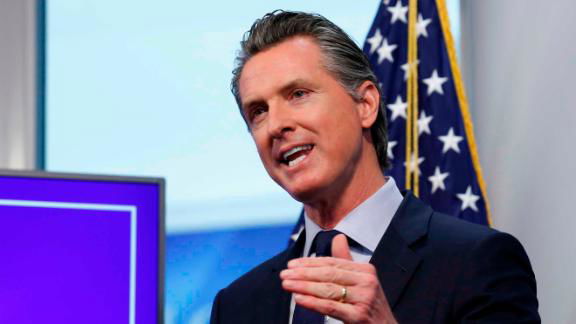California joins feds in bid to speed coronavirus vaccines

SACRAMENTO, Calif. (AP) California is joining with the federal government to open two new vaccination centers as test areas for new President Joseph Biden’s effort to create 100 mass vaccination sites nationwide in 100 days, Gov. Gavin Newsom said Wednesday.
The sites at the Oakland-Alameda Coliseum and California State University, Los Angeles, will be jointly run by the Federal Emergency Management Agency and the Governor’s Office of Emergency Services.
The move comes as California’s most deadly pandemic surge eases but as the state struggles with vaccine shortages and bureaucratic headaches in a race to vaccinate a sometimes bewildering array of the most vulnerable.
The new sites are scheduled to open Feb. 16 for eligible members of the public, who will be able to sign up for vaccine appointments using the state’s MyTurn scheduling system.
Newsom promoted the new sites as part of the larger effort to target communities that might otherwise be left behind.
Each will have two mobile vaccination clinics that can be sent to different locations to help vaccinate people in other areas that otherwise might not be targeted.
“Partnership is key, especially when it comes to reaching Californians in underserved areas,” Newsom said in a statement thanking Biden, his fellow Democrat. “These new sites will help us get available supply to some of the California communities most in need.”
The sites were picked because they are in what Newsom’s administration called some of the nation’s most diverse and poor areas.
His administration also said they are home to people who have been disproportionately harmed by the virus — including essential employees who have continued to go to workplaces during the pandemic.
Newsom planned an online news conference Wednesday in the San Francisco Bay Area about the deal with the federal government.
FEMA will provide resources and federal employees to create the new vaccination centers and support to operate them once they are running. Doses administered there will not reduce the host county’s allotment, Newsom’s office said.
Acting FEMA Administrator Bob Fenton in a statement called the opening of the sites “a significant step forward in the ongoing effort to ensure every American who wants a vaccine will receive a vaccine.”
Los Angeles County Board of Supervisors Chair Hilda Solis said the new site there is “a welcome signal that we are ramping up at the federal, state and local level with the practical, boots-on-the-ground solutions.”
The most-populous county already has five large county-run sites amid nearly 300 vaccination locations. She planned to ask the board next week to approve her plan to work with transit agencies and the county’s bus system to help residents get to the sites if they don’t have their own vehicles.
The vaccine ramp up comes as infection rates and hospitalizations fall in California after a months-long coronavirus surge.
The number of new virus cases reported Tuesday was just over 12,000, the lowest daily figure since November. In early January, daily counts routinely were above 40,000.
Hospital capacity is rising after plunging so low in December that overwhelmed facilities talked about rationing care. If current trends continue, the number of COVID-19 hospital patients will fall by half by early March, Health and Human Services Secretary Dr. Mark Ghaly said Tuesday.
Southern California — the most populated and hardest-hit of five state-designated regions — exhausted its regular ICU beds and stayed at 0% capacity through January. But the state projects that in four weeks, the Southern California region could have ICU capacity of 44%.
California has recorded more than 41,000 deaths — putting it only behind New York among states — but even that pace may be starting to fall. After averaging 544 daily deaths last week, the last three daily counts have averaged 371.
Still, Ghaly warned that “the chance for another surge in California is real” if mutations of the virus become prevalent or if people drop their guard, including with Super Bowl celebrations this weekend.
Meanwhile, the state of nearly 40 million residents is working to smooth out a bumpy rollout of COVID-19 vaccines that was marked by too few doses and differing county rules for who was immediately eligible to receive them.
Ghaly said the state has administered more than 3.5 million vaccine doses, significantly boosting the daily number of shots it was giving out just weeks ago.
California still lags other U.S. states in vaccinations, according to the Centers for Disease Control and Prevention, and desperate residents report ongoing problems trying to schedule appointments.
Officials made the major announcement last week that the state was creating a new, centralized vaccine distribution system led by Blue Shield, the insurance giant.
But specifics of the program are still being developed even as state officials had said they hoped to transition to the new system in mid-February.
The state has authorized health workers, teachers, food and agriculture employees, other first responders and people 65 and older to be inoculated.
In a surprise move last week, Newsom announced the state would next move to an age-based system, outraging, among others, people with disabilities who had been earlier in line.
“What they’re saying is, they’re willing to protect all the people and caregivers surrounding people with disabilities, but not the people with disabilities themselves,” said Judy Mark, president of Disability Voices United.